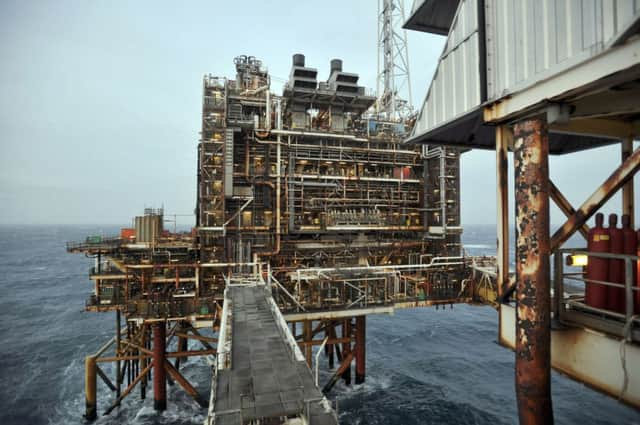Fresh blow as more North Sea oil jobs axed


Global giant Schlumberger said the job losses – believed to be in the region of 100 – were in response to the tumbling global oil price. Leading analysts warned prices are poised to keep falling to an 11-year low in the months ahead.
Earlier this week, BP announced 300 North Sea job losses, following on from Shell and Chevron, which last year also unveiled plans to axe hundreds of jobs.
Advertisement
Hide AdAdvertisement
Hide AdThe latest cuts came as Chief Secretary to the Treasury Danny Alexander urged firms to “stay the course” in the North Sea.
Union chiefs said news of the latest job losses capped a “grim week” for the North Sea after holding crisis talks with industry leaders in Aberdeen yesterday.
The oil and gas industry is worth £35 billion annually to the UK economy, but a recent Scottish Parliament report suggested the current crisis could see 15,000 jobs axed of the 200,000 posts based north of the Border.
Schlumberger, the world’s largest oil and gas services group, confirmed North Sea jobs would be lost as part of its plans to cut 9,000 posts internationally. A spokeswoman said: “The dramatic fall in oil prices over the past quarter has led our customers to decrease exploration and production activity worldwide. As a result, Schlumberger is reducing headcount in line with lower activity levels and this is unfortunately impacting our North Sea operations and people.”
It is understood that more than 100 jobs will be lost in the North-east and offshore, although a spokeswoman refused to confirm exactly how many posts would go in Scotland.
Oil prices have slumped to under $50 a barrel in recent months – less than half its value last summer.
Prices will continue falling to $31 by the end of March as global supply outstrips demand, analysts at Bank of America Merrill Lynch warned yesterday.
A fall to $31 a barrel would see the price of Brent crude hit levels not seen since April 2004. This means good news for motorists at the pumps with cheaper petrol prices, but it has prompted cost-cutting measures in one of Scotland’s biggest industries.
Advertisement
Hide AdAdvertisement
Hide AdMick Cash, general secretary of the Rail, Maritime and Transport union, said: “This is yet more bad news coming at the end of what has been a grim week for the offshore industry. All the signals that the union is receiving suggest that there is far worse to come.”
Union chiefs met representatives from industry body Oil and Gas UK in Aberdeen yesterday after the latest job cuts and amid concerns of more to follow. As well as the job losses, several operators are also believed to be moving contractors from the standard 14-day spell offshore to shift-patterns that will see them away for up to three weeks at a time.
Industry leaders stepped up calls for government tax breaks after yesterday’s talks.
Oonagh Werngren, Oil and Gas UK’s operations director, said: “We listened to the unions’ concerns in light of rising costs and declining production, exacerbated by the fall in oil prices.
“The industry is working hard with government on fiscal and regulatory reform to help safeguard the long-term future of our industry.
“Oil and Gas UK and the unions have today agreed to join together in calling for this much-needed reform.
“We also agreed to meet the unions again as soon as possible for further discussion.”
Mr Alexander indicated that a new fiscal regime will be established ahead of the forthcoming Budget to provide support for the “crucial industry”.
Advertisement
Hide AdAdvertisement
Hide AdMr Alexander, who is also the MP for Inverness Nairn, Badenoch and Strathspey, said the government was now formulating the “right measures”.
“I think particularly the new investment allowance, which is about giving people significant tax breaks,” he said yesterday.
[Energy Secretary] Ed Davey yesterday announced a commission, which will be led by Andy Samuel, who is leading the new Oil and Gas Authority, to look at precisely what is needed.
He said: “I think that it is right to say, with the Budget just a few weeks away, let’s use that time to make sure we have the right, comprehensive measures to support this crucial industry.”
The UK government had already commissioned a major report by oil industry magnate Sir Ian Wood on measures needed to maximise recovery of the remaining North Sea reserves.
Mr Alexander added. “What matters is having a regime that, exactly as Sir Ian says, incentivises investment and encourages people to stay the course in the North Sea
“Because, of course, the oil price, all the analysts suggest, will start to recover in the years to come, so we need to put ourselves in the position where the infrastructure is being maintained, where the fields are being maintained, so that we can capitalise as and when that does happen.”
Sir Ian said yesterday that a major tax cut was necessary to give producers the confidence to keep their North Sea operations going.